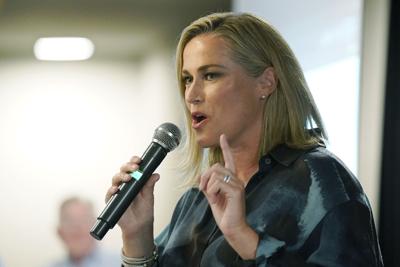(The Center Square) – Washington state’s largest newspaper sent the Republican candidate for U.S. Senate a cease and desist letter.
The Seattle Times’ complaint concerned the Tiffany Smiley campaign’s use of the Times logo and some headlines in one ad. Smiley fired back with a letter of her own, this one to the Federal Elections Commission.
“While unfair and bias reporting and commentary is likely protected by the First Amendment…that speech protection does not apply to providing corporate resources to a campaign,” explained the complaint letter to the FEC by Charlie Spies and Katie Reynolds, co-counsel for the Smiley for Washington campaign. “What is illegal is for [the Seattle Times] to provide its resources to Patty Murray, and her campaign committee People for Patty Murray, while at the same time denying such resources to her opponent.”
The rub for the Smiley campaign was that incumbent Sen. Patty Murray, D-Bothell, who the Times has endorsed, has used the Times logo and headlines in her own ads without facing a challenge.
The Times did not reply to requests for comment but did post a comment in a story that was part of its normal campaign coverage.
“As it relates to political advertising, we try to be very cognizant of fair use,” Kati Erwert, a Seattle Times senior vice president, said. “In this instance specifically, it is using it for an inferred endorsement of her campaign, which violates the policy and is the reason for the cease and desist.”
In the challenged 30-second campaign ad, Smiley begins by pointing to a shuttered Seattle Starbucks and saying, “These doors are closed because it’s too dangerous to ask employees to work here anymore.” Then, while she says that opponent Murray has “spearheaded reckless policies,” the Seattle Times logo and headline appear, saying, “Seattle’s Awful August Shows the City Continues to Backslide on Crime.”
Similarly, when Smiley complains that the city is suffering from “so much crime that you can’t even get a cup of coffee from the hometown shop on Capitol Hill, even if you can still afford it,” another Times headline appears that underscores her point. This one reads, “Starbucks to Close 5 Seattle Stores Over Safety Concerns.”
Both of these headlines accurately reproduce headlines that appeared in the Times.
Starbucks also wrote to the Smiley campaign to complain about the use of its corporate logo on display at the shuttered, graffitied store. The Seattle Seahawks sent a similar complaint about a commercial that features Tiffany’s husband, Scotty Smiley, wearing a Seahawks jersey.
The Smiley campaign characterized the Starbucks and Seahawks letters as making “frivolous claims” in a news release.
Joel Ard is a Washington state-based lawyer who has experience with intellectual property and fair use law. After viewing the ads, he told The Center Square Thursday in a phone interview, “It’s so blatantly fair use that if someone wanted to make this claim in federal court, they’d likely be sanctioned for it.”
To prove trademark violation, the companies would have to show their logos were used in a way that clearly signaled an endorsement of the Smiley campaign.
He added for emphasis, “These letters are absolutely wrong on the law.”
Ard didn’t claim any special knowledge about how the FEC is likely to rule on her complaint, but he said of the Smiley campaign letter, “What a great way to fight back.”
He argued that her campaign makes “a great point” about selective trademark claims, and thought that her response effectively showed, “These organizations are acting in a very biased manner.”









